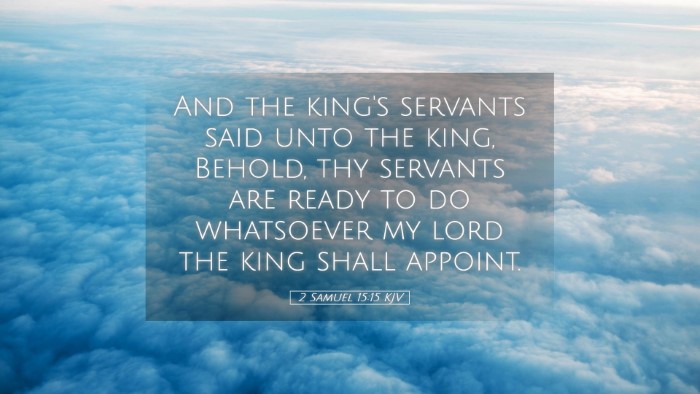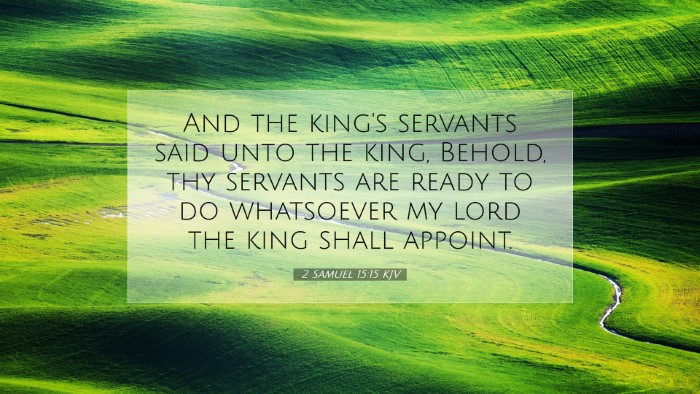Commentary on 2 Samuel 15:15
Bible Verse: "And the king's servants said unto the king, Behold, thy servants are ready to do whatsoever my lord the king shall appoint."
Introduction
This verse occurs in a context of significant turmoil within the kingdom of Israel, as it marks a time of rebellion led by Absalom, David's son. In this charged atmosphere, the readiness of David's servants to support him reflects loyalty and dedication amidst political strife. The commentaries of Matthew Henry, Albert Barnes, and Adam Clarke provide valuable insights into the implications of this statement and its broader theological significance.
Analysis of the Verse
2 Samuel 15:15 showcases the dynamic between King David and his loyal servants during a period of upheaval. Rather than simply acting or reacting, the verse illustrates a conscious commitment from David's servants to support their king’s decisions. There are several key themes that emerge from this passage:
- Loyalty in Times of Crisis: This verse exemplifies the loyalty of David's servants, who stood by him during his most tumultuous hours. They essentially declare their unyielding readiness to enact the king’s will, underlining a principle crucial for any leader's success.
- The Role of Leadership: David embodies the character of a king who not only commands but inspires voluntary service from his followers. The loyal response of his servants suggests that effective leadership invites participation rather than coercion.
- The Doctrine of Providence: Underlying this immediate situation is the providential care of God, who maneuvers circumstances to fulfill His purposes, even through human actions and decisions. The loyalty of David’s servants can be seen as part of God's overarching plan for Israel.
Insights from Matthew Henry
Matthew Henry emphasizes that the verse illustrates the readiness of David's attendants to act in his service, which is particularly significant given the backdrop of the rebellion. He notes:
- David's servants, despite the impending rebellion, exhibit their commitment and allegiance. This suggests a loyalty that transcends political strife, an important lesson for leaders who may feel isolated in their trials.
- Henry points out that the nature of servanthood is not merely about fulfilling duties but responding out of love and loyalty, implying that the heart attitude of servants is equally important as the act of service itself.
Insights from Albert Barnes
Albert Barnes examines the emotional and practical implications of the statement made by David’s servants. He draws attention to the following points:
- The phrase "thy servants are ready" speaks volumes of the trust and unity that existed between David and his followers. It reflects a kingdom where the subjects are motivated to support their king willingly.
- Barnes highlights the context of crisis as a moment that tests loyalties and resolves. He infers that the stance taken by David's servants serves as a model for contemporary believers in standing firm in faith during adversity.
Insights from Adam Clarke
Adam Clarke offers a detailed examination of the responsibilities associated with servanthood, particularly in crisis situations. He presents these key components:
- The loyalty expressed by David's servants serves as a reminder of the collective commitment that followers have towards divine authority. Clarke stresses that servanthood in any capacity should align with unwavering respect towards God-ordained leadership.
- Clarke further reflects on the implications of declaring oneself "ready." He contemplates the spiritual readiness necessary for believers to engage actively in their communities, serving as both a witness and an instrument of God’s will.
Theological Reflections
The verse invites deeper theological considerations, especially regarding the nature of service and commitment to God-given authority. The following points can be derived:
- Service as Worship: The readiness of the king's servants can be viewed as a form of worship, reflecting a heart aligned with God’s purposes. Believers today are called to serve eagerly in the Kingdom of God.
- Authority and Submission: Within this narrative, the complex relationships of authority and submission are illustrated. It is essential to comprehend that submitting to authority does not negate one’s agency but rather fulfills God’s ordained order.
- Endurance in Trials: The narrative surrounding this verse serves as an encouragement for pastors and leaders facing trials. It reinforces the notion that loyalty and readiness can create an environment of mutual support and perseverance.
Conclusion
2 Samuel 15:15 serves as a powerful testament to loyalty, commitment, and the essential nature of support within leadership. Through the combined insights of Matthew Henry, Albert Barnes, and Adam Clarke, we understand the profound implications this statement has for understanding servanthood, authority, and the role of providential care within the community of faith. As we reflect on this verse, may we be inspired to embody a similar readiness and loyalty in our own lives, dedicated to serving God's purposes amidst challenges.


